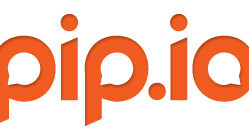
 Social startup Pip.io has been enigmatic from the beginning. Claiming to be creating a web based “social OS,” they used to bill themselves as “what Wave should have been.”
Social startup Pip.io has been enigmatic from the beginning. Claiming to be creating a web based “social OS,” they used to bill themselves as “what Wave should have been.”
You can now get a full look at just what Pip.io has envisioned for the future, today. The company has finally reached the end of their beta cycle, and have released their 1.0 version of Pip.io.
Along with some very welcome UI tweaks, the core of the product has been fully upgraded and is now, according to corporate sources, 60% faster with a half-size code base.
Applications and other open items can now be minimized to the top bar from the refreshed sidebar removing the clutter that was something of a problem in earlier releases. Pip.io has also introduced an app section where it is planning to build out different applications (think plugins for you system). According to the page only one is live as we speak, but applications for Facebook, Twitter, and YouTube are coming “soon.”
The company will also be releasing a full API in the coming weeks to bring in external developers to build on top of the Pip.io platform. The company has promised that the API will be as open and flexible as possible.
While the company is today releasing the 1.0 verion of Pip.io, they claim that they will move to version 1.7 very quickly. They are holding back some features to test scalability, attempting to prevent any potential downtime.
Below is a screenshot of the new Pip.io:
The chat client inside of Pip.io has been upgraded to allow for in-Pip.io video chatting. The video chatting application is built on peer-to-peer technology and requires no installation by users, unlike the popular Gchat video tool.
The most interesting part of 1.0 Pip.io that has been expanded from earlier versions is the room capability. Rooms are almost like groups, and can be set to private to block the wrong people from entering. Rooms can also be the epitome of narcissistic, with limited members contributing, and everyone following. You can almost think of them as aggregated Pip.io users into a single space that other people can follow.
The company does not want people to stop using Facebook, but instead use Pip.io as an add-along to what Facebook has accomplished. Whether that is true or not, Pip.io does provide a very different user experience. Traction according to the company has been excellent, with the invite system letting them track where new users were coming from.
The company told TNW that many existing users are beginning to use Pip.io with increased frequency. They expect the 1.0 to continue this trend. As a final feature note, they are taking a Twitter and not Facebook approach to friending. You can follow me, but I do not have to follow you.
What do I think of Pip.io? I have liked the product from the very first day that I used it. It has yet to become a product that I use every day, but if the vision that Pip.io gave me in our screenshare and chat was accurate, it is something that I might just open every day next to Gmail and Tweetdeck. When you sign up for Pip.io, if you use the code “thenextweb” you and I will be connected automatically. You don’t need a code to sign up. Get started here.
Get the TNW newsletter
Get the most important tech news in your inbox each week.






